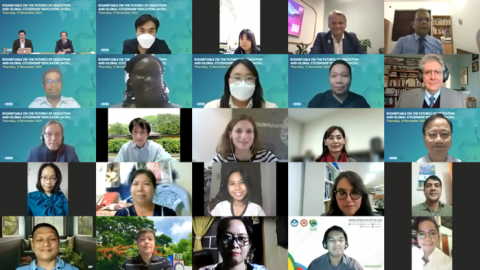
GCED Basic Search Form
Quick Search
You are here
News

On the occasion of ‘Reimagining our futures together: a new social contract for education’ was released at the 41st session of the UNESCO General Conference in November, the Roundtable on the Futures of Education and Global Citizenship Education (GCED) was held on 11 November 2021.
This event was co-organized by the Permanent Delegation of the Republic of Korea to UNESCO and the Asia-Pacific Centre of Education for International Understanding (APCEIU) in collaboration with the Group of Friends for Solidarity and Inclusion with GCED (Afghanistan, Armenia, Austria, Bangladesh, Canada, Colombia, Italy, Jordan, Kenya, Kuwait, Philippines, Republic of Korea, Saudi Arabia, Senegal, and Serbia) and the UNESCO Secretariat.
Mr Kim Dong Gi, Ambassador and the Permanent Delegate of the Republic of Korea to UNESCO opened the forum with his welcome remarks and expressed his gratitude towards the delegates of the Group of Friends for Solidarity and Inclusion with GCED and speakers of the event. And he highlighted the launch of the 'Reimagining our futures together: A new social contract for education' report and its own meaning in this pandemic. And he mentioned since we are living in the interconnected world, the effective solutions for many challenges should come from our minds.
During the meeting, the participants learned about the UNESCO’s perspective on futures of education a presentation given by Dr Sobhi Tawil, Director of Future of Learning and Innovation, UNESCO. He explained about the three main parts: background on UNESCO perspective, the evolution of thinking in terms of approaches to humanism and implications for global citizenship education.
Following the inspirational presentation, the panel discussion was initiated by the moderator, Ms Cecilia Barbieri, Chief of the Section of Global Citizenship and Peace Education UNESCO. The list of the distinguished panelists of the discussion is as follows:
- Ms Victoria Ibiwoye (Executive Director, One African Child Foundation for Creative Learning, Nigeria)
- Dr Wing On Lee (Executive Director, Institute for Adult Learning Singapore, Singapore University of Social Sciences)
- Prof. Fernando M. Reimers (Ford Foundation Professor of Practice in International Education and Faculty Director, International Education Policy, Harvard University, USA)
International Commission Member of the 'Futures of Education'
- Prof. Markku Wilenius (Professor, University of Turku, Finland. UNESCO Chair in Learning for Transformation and Planetary Futures)
Moreover, three key guiding questions were presented to engage the panelists on the discussion around the idea of envisioning the future of education.
Key Question 1
UNESCO's new report by the International Commission on the Futures of Education underlines the importance of rethinking and reimagining the meaning and role of education for the future society. What do you think will and should be the meaning and role of education in future society?
Key Question 2
The global community has recently strengthened efforts to promote Global Citizenship Education (GCED) as one of the key solutions to our most pressing challenges such as hate, discrimination, widening inequalities, climate crisis, and the pandemic. Will GCED continue to be important in future society?
Key Question 3
In order to realize the potential of GCED, what actions will have to be taken by governments, civil society, academia, and international organizations like UNESCO?
Based on these questions, panelists are shared their thoughts and experiences with the participants. Also, since the new report was released the day before the forum, panelists are noted the importance and meaning of it.
In the closing remarks, Mr Lim Hyun Mook, Director of APCEIU, expressed his gratitude to Dr Tawil for his new UNESCO education report and presentation. He sincerely believes that the report challenges all readers to reimagine the vision of education in today's circumstances and shared his thought on the purpose of education. Director Lim concluded the forum to thank all panellists and Ambassador Kim Dong Gi and his team at the Permanent Delegation of the Republic of Korea to UNESCO for co-organizing the meeting.
URL:
http://www.unescoapceiu.org/post/4314
